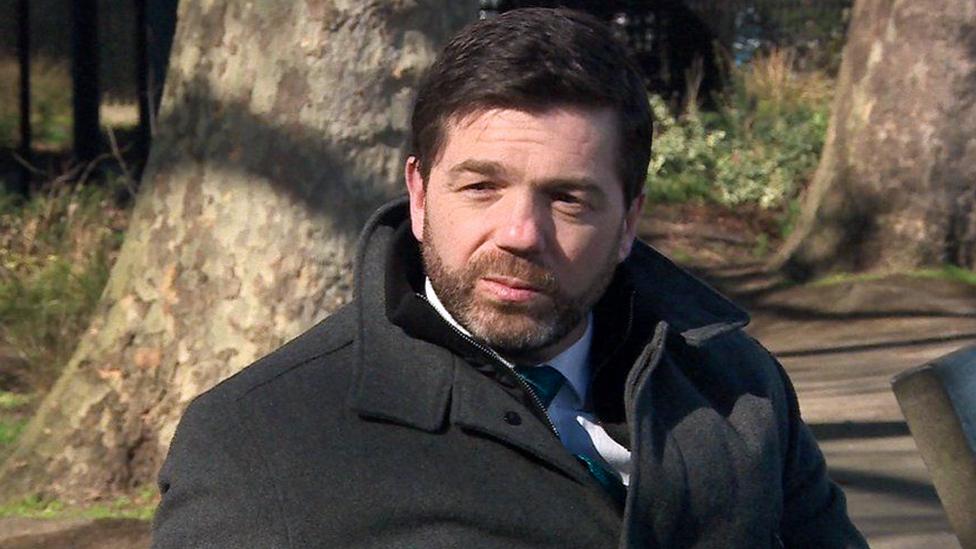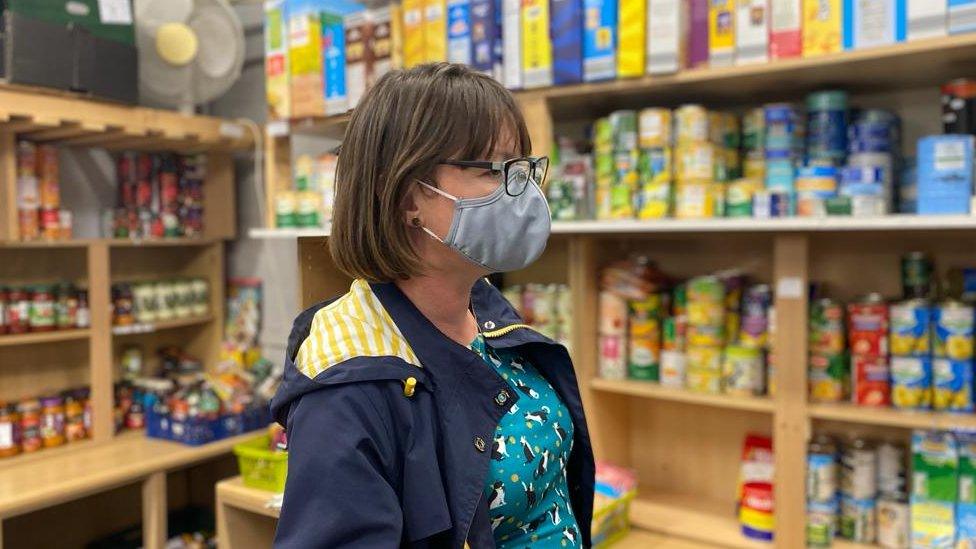Universal credit cut will push workers into poverty, warns Tory former minister
- Published

Stephen Crabb says the benefit freeze was a mistake
Next month's £20-a-week cut in universal credit risks pushing working people into poverty, a senior Conservative MP has warned.
The government says the £20 top-up was always a temporary measure to help people through the pandemic.
But former work and pensions secretary Stephen Crabb says the government risks repeating the mistake it made in 2015 when it froze working age benefits.
Labour is calling for the cut to be axed during a debate in the Commons.
Its leader, Sir Keir Starmer, attacked the government during Prime Minister's Questions, saying it was "clobbering working people" with the cut, coupled with the rise in National Insurance to cover the new health and social care tax.
But Boris Johnson said he wanted to "encourage high wages and high skills", and the government was focused on supporting people into work with better pay.
Labour plans to force a vote on the cut on Wednesday, but the result will not be binding on the government.
'Very concerned'
Mr Crabb has joined a growing number of Tory MPs - including five other former work and pensions secretaries - who are against removing the £20 uplift.
"I was part of the team that took that decision to freeze benefits - and wages didn't go up in the way that we believed they would. Levels of poverty increased," he told BBC News.
"We should seek to learn the lessons of that rather than just repeat it."
The-then Chancellor George Osborne said low-paid workers would be better off despite the four-year freeze, thanks to tax changes and increases in the minimum wage.
But Mr Crabb - who was Welsh Secretary at the time - said it had amounted to a "real-terms cut" in benefits, which had been "a contributing factor to the rise of in-work poverty".
Employment reached record levels before the pandemic, but the UK also saw a significant increase in the number of households with at least one adult in paid work falling into relative poverty, according to the Institute for Fiscal Studies, external.
There are 5.9 million people receiving universal credit payments across the country, according to the latest government figures - almost double the three million making claims before the pandemic.
While some are seeking jobs and others are unable to work, 40% of claimants are already employed.
The Resolution Foundation think tank said workers would have to put in an nine extra hours a week to make up for the loss of £20, once pension contributions, childcare and travel costs had been taken into account.
Mr Crabb is not the only Conservative calling for the £20 universal credit top-up - which will disappear on 6 October - to be made permanent.
West Midlands metro mayor Andy Street told the i paper, external he was "very concerned" about the potential impact of the cut - and Amber Valley MP Nigel Mills said the government "would be in trouble" if there was a Commons vote on it.
'Food or heating'
Opening Labour's Opposition Day debate in the Commons, shadow work and pensions secretary Jonathan Reynolds said removing the top-up would be "the single biggest overnight cut in the history of the welfare state", affecting one in 14 British workers.
He added: "The human cost of taking this money away cannot be overstated - £20 might not seem like much to some people but it's the difference between having food in the fridge and still being able to put the heating on, or being able to get their kids new school shoes without worrying how you'll pay for it."
But his government counterpart, Therese Coffey - who was criticised over comments on the cut earlier this week - said more people were getting back into work under the Conservative government, and there was "a record number" of vacancies for those seeking jobs.
"It was right that we took prompt and decisive action to support our nation during this challenging time," she added. "[But] this was a temporary uplift recognising the financial impact of people newly unemployed so that it would be somewhat of a cushion in regards to their financial circumstances.
"As our economy continues to recover, it is right that we are investing in jobs and skills to boost pay, prospects and prosperity for people right across the UK as part of our plan to level up and build back better."

'I'm doing everything I can to better my prospects'

Catherine says the stereotypes about benefit claimants are false
Catherine, a mature student training to be a primary school teacher, is a client of Pembrokeshire Action to Combat Hardship, a food bank in Stephen Crabb's constituency.
She says the prospect of losing so much weekly income is "quite scary".
"Do we put the heating on, or do we put a jumper on? Can we manage to make this week's shopping to stretch a bit further?"
Catherine is in receipt of student finance as well as universal credit, as a single parent. She says the "stereotype" that people on benefits are not making an effort, is "absolute rubbish".
"I'm doing everything I can to better my prospects for myself and my family. I've paid into the system in the past I will pay into the system in the future."

The number of people claiming universal credit has nearly doubled since the start of the pandemic, external, which Mr Crabb says undermines a key government argument for axing the £20 top-up.
"Almost half of people on universal credit have only known this level of benefit. The idea of this being people going back to a level of benefit they were used to - that's completely false."
He suggested that introducing the £20 top-up was effectively a "recognition that the current level of working age benefits was too low".
And with 40% of people on universal credit using it to top up their wages, he feared the "very sharp" cut would hurt "people who are trying to do the so-called 'right thing' by going out to work".
"As a Conservative that is deeply problematic for me," the Preseli Pembrokeshire MP added.
A government spokesperson said the universal credit uplift had achieved its aim of helping claimants through the "economic shock and financial disruption of the toughest stages of the pandemic".
"Universal credit will continue to provide vital support for those both in and out of work and it's right that the government should focus on our Plan for Jobs, supporting people back into work and supporting those already employed to progress and earn more," the spokesperson added.